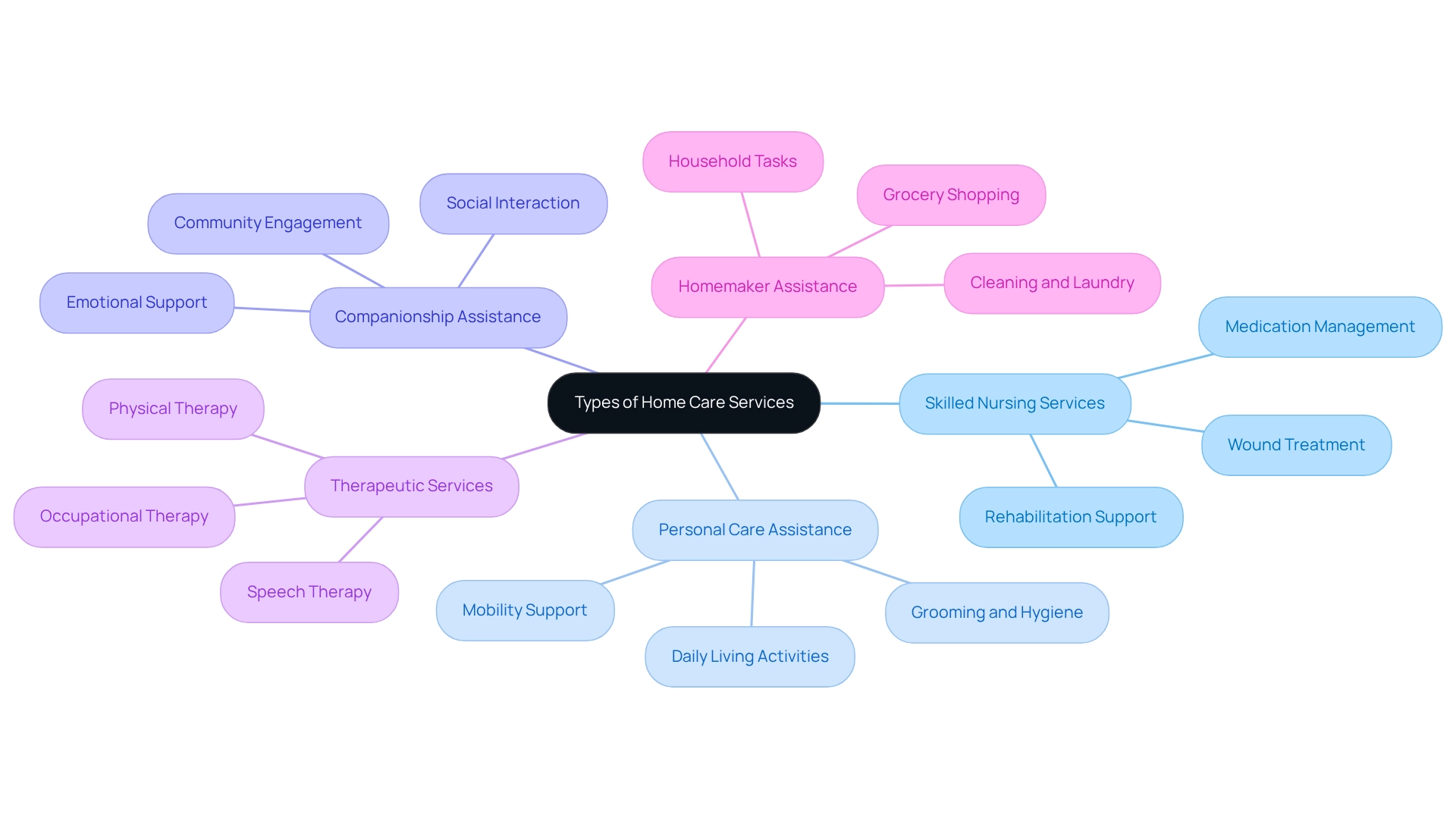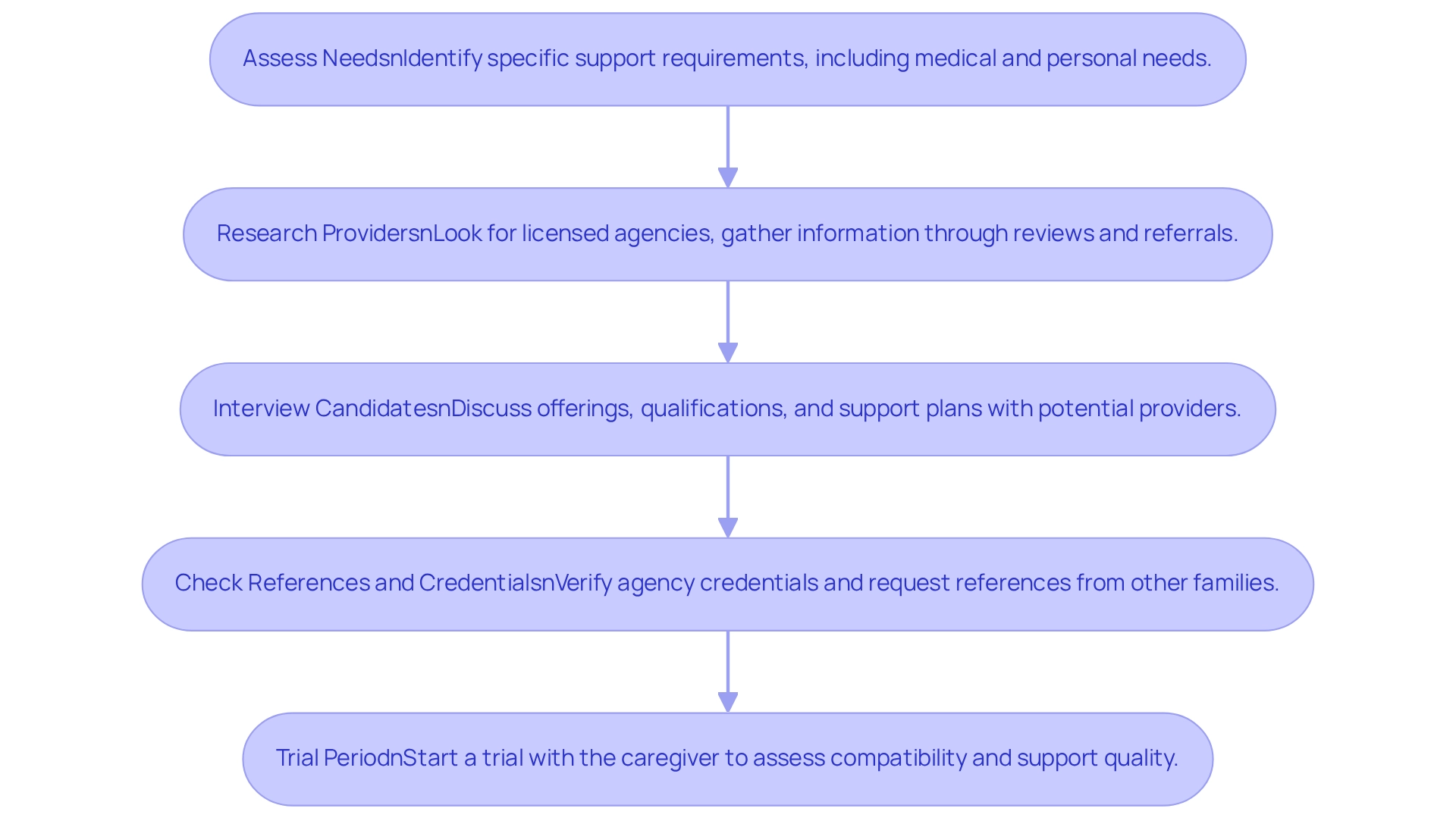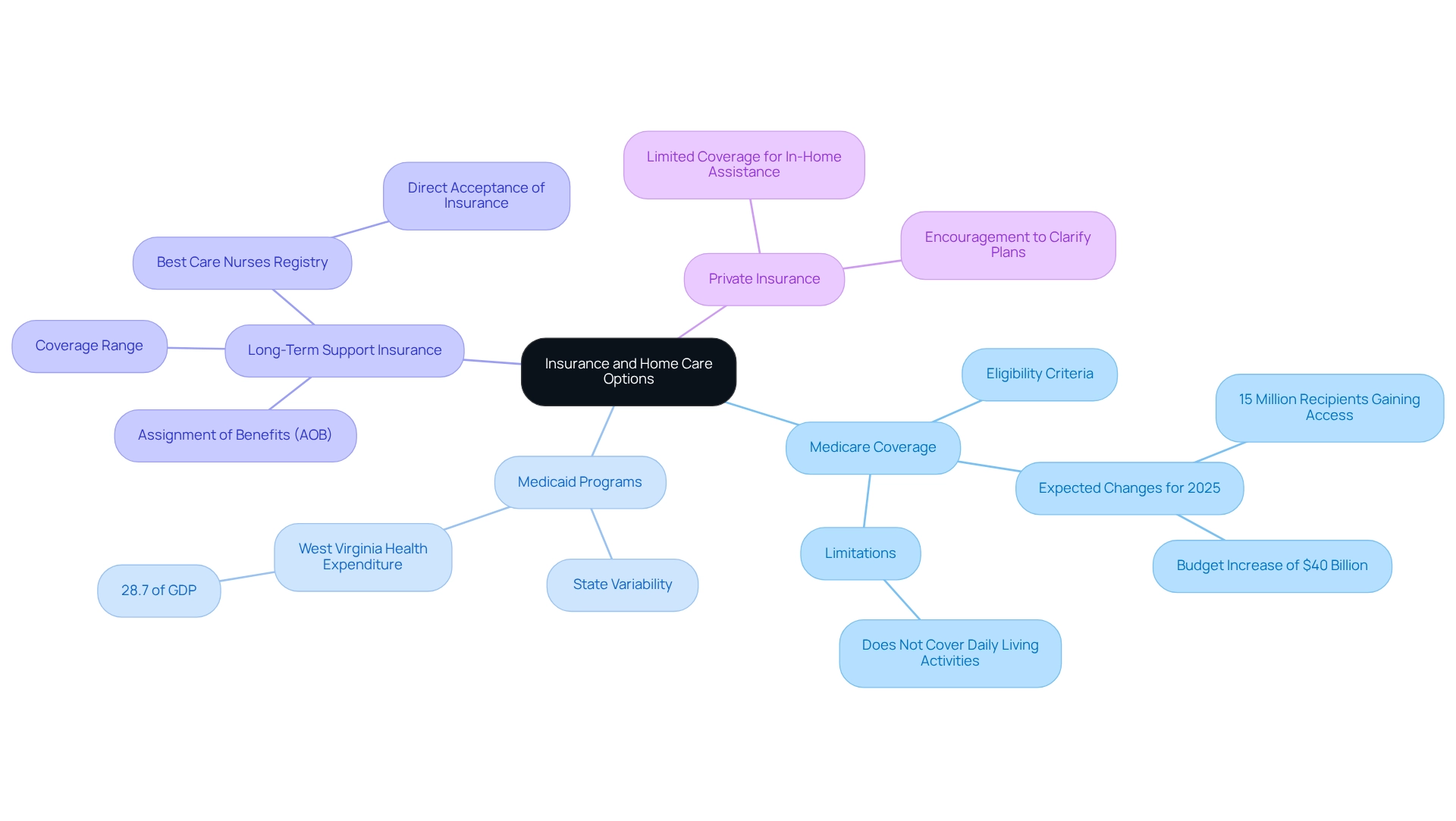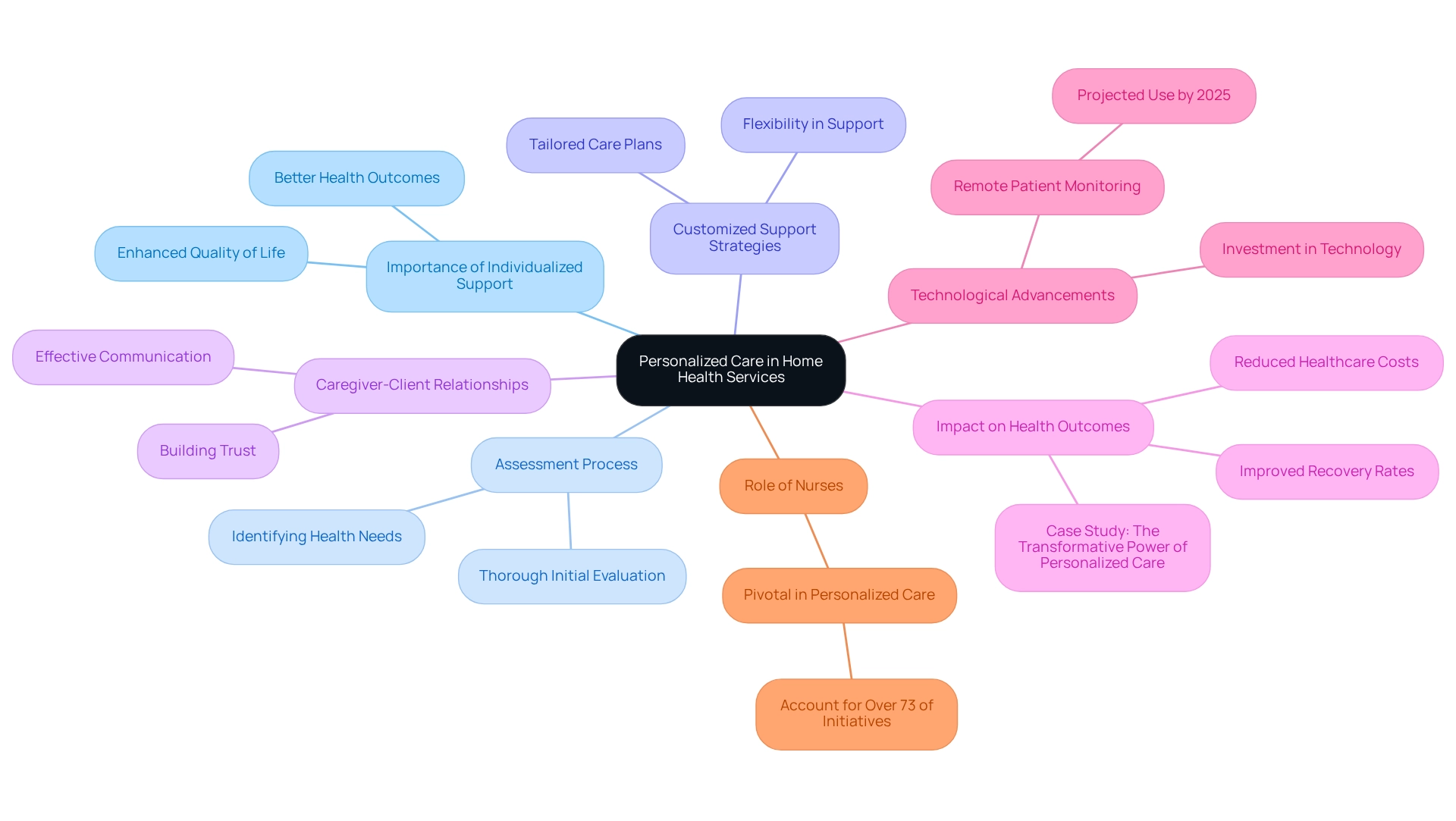Overview
Health services in home care provide a range of medical and non-medical support options tailored to assist individuals in the comfort of their own homes. This is especially beneficial for the elderly, those recovering from surgery, or individuals managing chronic illnesses. These services not only promote independence and enhance health outcomes but also prioritize the emotional well-being of clients. As the demand for personalized care continues to rise, these services become an essential part of the healthcare continuum, ensuring that everyone receives the compassionate support they deserve.
We understand that navigating health challenges can be overwhelming, and that’s why we’re here for you. Our home care services are designed to meet both your medical and emotional needs, fostering a nurturing environment where you or your loved ones can thrive. By choosing home care, you’re not just opting for assistance; you’re embracing a holistic approach to health that values your independence and comfort.
As a result, we invite you to explore how our dedicated team can make a difference in your life. Your comfort is our priority, and together, we can ensure that you receive the compassionate care you need. Let us support you on this journey towards better health and well-being.
Introduction
In an increasingly complex healthcare landscape, home care services are emerging as a vital solution for families seeking personalized and compassionate support for their loved ones. These services, which range from skilled nursing care to companionship, enable seniors to maintain their independence in the comfort of their homes. They also address the diverse needs that arise from aging, recovery, or chronic illness management.
As the demand for home care continues to surge—driven by an aging population and a preference for aging in place—understanding the types of services available and how to navigate the selection process is crucial. This article delves into the world of home care, exploring its benefits and costs, while emphasizing the importance of personalized care.
We’re here for you, providing families with the essential tools to make informed decisions for their loved ones’ well-being. Your comfort is our priority, and together, we can ensure that the support you seek is both compassionate and effective.
Understanding Home Care Services: An Overview
Assistance options encompass a wide range of health services home care and supportive offerings delivered conveniently at a patient’s residence. These services are tailored to support individuals who may be aging, recovering from surgery, or managing chronic illnesses. By providing health services home care in a comfortable environment, in-home support allows patients to maintain their autonomy while receiving essential help for daily tasks and health needs.
In 2025, the landscape of at-home support options is evolving significantly. With over 1.4 million individuals residing in Medicare- and Medicaid-approved nursing facilities nationwide, the demand for health services home care is on the rise. This trend is fueled by an increasing elderly population and a growing preference for health services home care to facilitate aging in place.
Recent statistics reveal that approximately 70% of seniors are currently utilizing health services home care options, indicating a shift towards more personalized and adaptable assistance choices.
In-home support can generally be categorized into two types:
- Medical support, which includes skilled nursing and therapy provided by private duty RNs and LPNs
- Non-medical support, which focuses on personal assistance and companionship
This comprehensive approach not only addresses the medical needs of patients but also enhances their emotional well-being, making health services home care an appealing choice for families seeking to improve the quality of life for their loved ones.
Case studies highlight the effectiveness of health services home care in fostering patient independence. For instance, organizations that have implemented innovative staffing strategies have successfully met the growing demand for assistance, ensuring that more patients receive timely and appropriate support. This is particularly crucial as many health service agencies face challenges in accepting new patients due to staffing shortages.
Best Care Nurses Registry, with its extensive experience and strong reputation since 1980, emerges as a trusted option for families in South Florida, effectively addressing these challenges.
The benefits of health services home care for seniors are abundant. They provide health services home care that instills a sense of safety and reassurance, alleviates the emotional burden on families, and enables customized support plans that cater to individual needs. As telehealth services have surged, with claim lines increasing by 47% from 2019 to 2022, the integration of technology into home support is further enhancing the accessibility and efficiency of service delivery.
Moreover, licensed caregivers earn an average base wage of $15.65 per hour, reflecting the value of skilled professionals in this field.
In conclusion, the importance of health services home care for seniors cannot be overstated. It not only promotes their health and well-being but also empowers them to live independently, surrounded by the comfort of their own environment. As the home support sector continues to adapt to the needs of an aging population, it remains a vital component of the healthcare continuum, with Best Care Nurses Registry leading the way in providing exceptional assistance.
Types of Home Care Services: Exploring Your Options
Options for health services home care encompass a variety of types specifically designed to meet the diverse needs of older adults and those requiring assistance. Understanding these options is essential for families seeking the right support for their loved ones.
- Skilled Nursing Services: Delivered by registered nurses (RNs) or licensed practical nurses (LPNs), skilled nursing services offer vital medical support, including assessments, medication management, wound treatment, and rehabilitation. This support is crucial for individuals with complex health needs, ensuring they receive professional medical attention in the comfort of their homes. At Best Care Nurses Registry, we specialize in providing skilled nursing services, guaranteeing personalized and compassionate assistance.
- Personal Care Assistance: This support focuses on aiding with daily living activities such as bathing, dressing, grooming, and meal preparation. Personal care is especially important for seniors who may face mobility challenges or other health issues, as it helps maintain their dignity and quality of life. Our caregivers at Best Care are trained to provide this essential support, enhancing the overall well-being of our clients.
- Companionship Assistance: By offering social interaction and emotional support, companionship assistance plays a vital role in alleviating loneliness and isolation among seniors. Engaging caregivers can significantly improve the emotional well-being of clients, fostering a sense of connection and community. This aspect is particularly important since social isolation can lead to serious health problems, making companionship support a key element of residential care.
- Therapeutic Services: This category includes physical, occupational, and speech therapy, which are essential for recovery and rehabilitation. These services help clients regain autonomy and enhance their overall functionality, making them a critical component of health services home care.
- Homemaker Assistance: These services support household tasks such as cleaning, laundry, and grocery shopping, enabling clients to maintain a safe and organized living environment. By alleviating the burden of everyday tasks, health services home care allows seniors to focus on their health and wellness. Best Care Nurses Registry offers flexible support options, including round-the-clock assistance, tailored to meet each client’s specific needs. Since 1980, we have been dedicated to providing compassionate caregiver referrals, ensuring individuals receive the support they need during challenging times.
With no minimum hours required and various payment options available, including long-term insurance claims assistance and private payment alternatives, we simplify access for families to the care their loved ones deserve. The remarkable growth of skilled nursing support in residential settings underscores the importance of health services home care, as more families recognize the value of professional assistance.
In 2025, the demand for health services home care continues to increase, driven by an aging population and the desire for aging in place. Statistics reveal that over half of assisted living residents require help with walking and bathing, highlighting the necessity for comprehensive health services home care solutions.
Additionally, recent advancements in skilled nursing services reflect a commitment to quality improvement and patient safety, supported by regulatory bodies that have implemented policies to enhance healthcare delivery. Government funding for health services home care programs has increased, promoting aging in place and improving patient safety. As a result, the total client satisfaction rate for health services home care options reached an impressive 89.2% in 2021, with 91% of patients expressing satisfaction with their support.
Moreover, a report from Market. Us indicates that 89% of patients were pleased with residential healthcare services, reinforcing the positive outcomes associated with this type of assistance.
By understanding the various types of health services home care available, families can make informed choices that best address their loved ones’ needs, ensuring they receive the compassionate and professional care necessary for a fulfilling life. To discuss your specific needs and explore how Best Care Nurses Registry can assist you, please call (888) 203-2529 to schedule a consultation.

How to Find and Choose Home Care Providers
Finding the right home support provider is crucial for ensuring that your loved one receives the best possible care. Here are some key steps to help you through this important process:
- Assess Needs: Begin by identifying the specific support requirements of your loved one. This includes evaluating both medical and personal needs, such as difficulties with daily activities, memory issues, managing chronic conditions, personal hygiene challenges, or emerging health concerns. Recognizing these signs will help you determine the right type of assistance, whether for personal support or specialized CNA/HHA services.
- Research Providers: Look for licensed and accredited assistance agencies in your area. Gather information through online reviews, referrals from healthcare professionals, and recommendations from friends. In 2025, families increasingly rely on these resources, with nearly 70% consulting online reviews before making a decision. This trend reflects the evolving nature of the home support industry, moving towards innovative, client-centered models. At Best Care Nurses Registry, we prioritize personalized caregiver matching to ensure compassionate support tailored to your loved one’s needs.
- Interview Candidates: Schedule meetings with potential providers to discuss their offerings, caregiver qualifications, and support plans. Ask about their experience with cases similar to your loved one’s needs, as this can provide valuable insight into their capabilities. Also, consider caregiver compensation; certified caregivers earn an average base pay of $15.65 per hour, which may influence your decision.
- Check References and Credentials: It’s essential to verify the agency’s credentials, including licensing and insurance. Request references from other families who have used their services to better understand their reputation and reliability. Additionally, consider the agency’s use of technological advancements, such as remote patient monitoring and electronic health records, which can significantly enhance the quality of care.
- Trial Period: Think about starting a trial period with the caregiver to assess compatibility. This allows for adjustments if needed, ensuring that both the caregiver and your loved one feel comfortable and supported. Regular check-ins and open communication with the caregiver can help monitor the quality of support and address any concerns promptly.
By following these steps, families can effectively navigate the process of choosing a provider that aligns with their specific needs and preferences. This organized approach not only alleviates the stress of decision-making but also enhances the overall quality of care received. For customized support, reach out to our caring team at Best Care Nurses Registry to develop a personalized health service solution.

Understanding the Costs of Home Care Services
The expenses associated with health services home care can vary significantly based on several factors, including the type of support required, the duration of care, and the geographical location. In 2025, families can expect to spend an average of $25 to $50 per hour for health services home care, with specific rates influenced by the complexity of the required support.
Hourly rates are commonly charged by domestic assistance agencies, reflecting the level of support provided. For instance, specialized nursing support within health services home care generally incurs higher costs compared to personal assistance options. In South Florida, the average hourly rate for in-home assistance aligns with national trends, typically ranging from $30 to $45 per hour. Meanwhile, in Wyoming, the average rate is around $34 per hour, showcasing regional pricing variations.
Some agencies may offer flat fees for specific services or packages, which can be more economical for families needing consistent support. This approach can help households budget more effectively for ongoing care needs.
Understanding insurance coverage is crucial for families managing the costs of residential assistance. Best Care Nurses Registry accepts most long-term health insurances directly on behalf of clients, simplifying the payment process. Most insurance carriers require a form called an Assignment of Benefits (AOB) to be completed by the policyholder, enabling direct payments to Best Care. While Medicare may cover certain health services home care, it typically does not assist with activities of daily living provided by private duty caregivers. Families are encouraged to explore long-term care insurance options, as these can significantly alleviate expenses associated with health services home care. Best Care is dedicated to helping families review their policies to understand coverage and requirements. In many cases, services can commence immediately without any out-of-pocket payment unless an elimination period is specified in the policy.
Numerous agencies, including Best Nurses Registry, provide flexible payment options, such as private pay, long-term insurance, and assistance with filing claims. Families should inquire about all available choices to ensure they can afford the necessary support. Given the rising costs of assisted living facilities—averaging $70,800 annually—gaining a clear understanding of health services home care pricing and insurance coverage becomes increasingly important for families seeking reliable assistance for their loved ones.
As the landscape of personal assistance evolves, families are encouraged to stay informed about the financial aspects of care, including typical expenses and potential fluctuations based on the type of aid and location. This awareness empowers families to make informed decisions that best meet their loved ones’ needs. According to Nurse Next Door, “For those evaluating private pay domestic assistance rates, they largely depend on the type of aid and location,” highlighting the importance of understanding these costs.
Additionally, a case study titled “How Much Does In-Home Care Cost Per Day?” provides an in-depth analysis of daily costs for various support options, aiding families in navigating the financial landscape of elder assistance.
Insurance and Home Care: What You Need to Know
Navigating insurance coverage for domestic assistance can feel overwhelming, but understanding the available options is crucial for families seeking support. Let’s explore some key points together:
- Medicare Coverage: Medicare Part A and Part B may cover certain health assistance provided at home if specific criteria are met, such as being homebound and needing specialized support. However, it’s important to note that Medicare does not cover assistance with daily living activities like the help provided by private duty caregivers. In 2025, around 15 million Medicare recipients are expected to gain access to compensated assistance, reflecting a significant policy change aimed at improving access for individuals with functional and cognitive disabilities. As Courtney Harold Van Houtven, a professor at Duke University School of Medicine, states, “Broadening coverage of compensated domestic assistance through Medicare would grant access to paid support services to approximately 15 million Medicare recipients and is projected to raise the budget of the Medicare program by $40 billion, or 4%.”
- Medicaid programs vary by state, with many offering home care coverage for eligible individuals, especially those with lower incomes. For instance, West Virginia allocates the largest health expenditure relative to GDP at 28.7%, showcasing a strong commitment to home care and other health programs, including residential support.
- Long-Term Support Insurance: Many long-term support insurance plans include home assistance services, but it’s essential to review the policy details to understand the coverage range. Best Care Nurses Registry accepts most long-term health insurances directly on behalf of clients, streamlining the process through an Assignment of Benefits (AOB). This allows clients to instruct their insurance providers to pay Best Care directly, reducing the financial burden associated with long-term support needs. Our insurance specialists are here to help clients navigate their policies and paperwork. Please remember that Best Care is not affiliated with any insurance company, nor does it offer or guarantee any policy coverage or benefits information.
- Private Insurance: Some private health insurance plans may offer limited coverage for in-home assistance. Families are encouraged to reach out to their insurance providers to clarify what is included in their plans.
Understanding these insurance options can significantly alleviate the financial strain of health services home care, enabling families to focus on providing the best support for their loved ones. As the landscape of domestic assistance evolves, staying informed about coverage changes and eligibility requirements is vital for maximizing benefits and ensuring access to necessary support. The historical context provided by the case study titled “Evolution of Medicare and Long-Term Care Coverage” underscores the importance of these proposed expansions in coverage.

The Importance of Personalized Care in Home Health Services
Individualized support is essential to the effectiveness of home health services, as it involves customizing plans to meet the unique needs of each client. This approach not only leads to better health outcomes but also enhances the overall quality of life for individuals receiving assistance.
Since 1980, Best Care Nurses Registry has been committed to delivering personalized support that addresses the specific needs of our clients.
A thorough assessment is crucial for identifying the specific health needs, preferences, and goals of each client. This initial evaluation serves as the foundation for developing a focused treatment strategy, ensuring that the support provided is both relevant and effective. After the assessment, caregivers at Best Care Nurses Registry can create customized support strategies that address the unique challenges faced by each person. This personalization is vital in managing chronic conditions and ensuring that support aligns with the client’s evolving needs.
Tailored support fosters stronger connections between caregivers and clients, enhancing trust and communication. This rapport is essential for efficient service delivery, as it encourages clients to express their needs and concerns openly, leading to a more supportive environment. One of the key advantages of personalized support is its inherent flexibility. Care plans can be adjusted as clients’ needs change, ensuring they receive appropriate support at all times. Best Care Nurses Registry offers 24-hour support options, enabling prompt adjustments to assistance as required.
The impact of individualized support on health outcomes is significant. Evidence shows that tailored health planning improves health metrics, especially for individuals with chronic conditions. A case study titled ‘The Transformative Power of Personalized Care’ illustrates how personalized health plans can lead to better recovery rates and reduced healthcare costs by focusing on individual needs and integrating various aspects of healthcare delivery.
Moreover, statistics indicate that over 70 million Americans are expected to utilize remote patient monitoring by 2025, which plays a crucial role in enhancing individualized health strategies through real-time health tracking and adjustments to treatment plans.
Client satisfaction with tailored residential support remains high, with many reporting improved health outcomes and a greater sense of well-being. As the landscape of domestic health assistance continues to evolve, the emphasis on individualized support will be vital in addressing the diverse needs of the elderly and their families. Nurses play a critical role in providing tailored domestic services, representing over 73% of these efforts, underscoring their importance in ensuring effective assistance.
By prioritizing personalized evaluations and tailored support plans, Best Care Nurses Registry can significantly enhance the overall experience for clients, ensuring they receive the compassionate and effective assistance they deserve. Furthermore, the promising future of domestic health services for organizations that invest in technology and workforce development will further improve the provision of personalized support. Best Care Nurses Registry also offers various payment options and assistance with long-term care insurance claims to ensure that our clients receive the support they need without financial stress.

Challenges of Home Care: Navigating Family Dynamics and Responsibilities
Caring for a loved one at home can present numerous challenges, especially concerning personal dynamics and responsibilities. The emotional strain of caregiving is profound, with recent studies indicating that nearly 50% of family caregivers experience burnout in 2025. This emotional toll often manifests as feelings of guilt, frustration, and exhaustion, particularly among those providing more than 20 hours of support per week, which can lead to a quicker decline in their physical health.
- Role Conflicts: Family members may grapple with shifting roles, particularly when transitioning from being a spouse or child to a caregiver. This shift can create tension and misunderstandings, complicating relationships and support dynamics.
- Emotional Strain: The emotional burden of caregiving can be overwhelming.
Caregivers frequently report feelings of isolation and stress, which can be exacerbated by the unique challenges of caring for individuals with complex health issues, such as veterans who may require specialized support. In fact, there are approximately 5.5 million caregivers in the U.S. caring for former or current military personnel, with 96% of these caregivers being female, highlighting the specific emotional and practical challenges they face.
- Communication Breakdowns: Effective communication is vital in caregiving; however, differing views on treatment methods among relatives can lead to conflicts. This discord can hinder the caregiving process and increase stress levels for everyone involved.
- Balancing Responsibilities: Many caregivers find themselves juggling work, personal life, and caregiving duties, which can create significant stress and overwhelm. A significant portion of caregivers rely on both unpaid (50%) and compensated (32%) assistance to manage these duties efficiently.
Professional support options, like those provided by Best Care Nurses Registry, can ease some of these pressures by utilizing health services home care, enabling households to focus on their connections while ensuring their loved ones receive the essential attention they deserve. With adaptable respite support options and customized health services home care solutions, Best Care provides skilled nurse visits for seniors and assistance for new parents, addressing the emotional and practical requirements of households. Furthermore, Best Care accepts most long-term support insurances directly, streamlining the payment process for families.
By providing individualized assistance, these programs help alleviate the emotional burden and enhance the overall welfare of both caregivers and care recipients. As therapists emphasize, managing caregiver stress is essential for maintaining healthy dynamics and ensuring sustainable caregiving practices. Supporting working caregivers is no longer a ‘nice to have’ benefit; it’s critical to maintaining a stable workforce, as the alternative can lead to stretched-thin teams rife with turnover, low morale, and dwindling productivity.
Reviews from families that have used Best Care’s offerings highlight the positive impact on their caregiving journey, underscoring the significance of expert assistance in managing these challenges.
Benefits of Home Care Services: Enhancing Quality of Life
Home support services offer a multitude of advantages that significantly enhance the quality of life for clients and their families, fostering a nurturing environment.
Independence: Imagine the comfort of staying in familiar surroundings. In-home support not only promotes autonomy but also nurtures emotional well-being. At Best Care Nurses Registry, we ensure that your loved ones can thrive at home, supported by compassionate caregivers who understand their needs.
Personalized Attention: Each client deserves tailored, one-on-one support that meets their unique needs. This personalized approach leads to better health outcomes and greater satisfaction with the care received. As Samruddhi Yardi notes, ‘Health services home care offer numerous advantages, such as the opportunity to receive assistance in the comfort of one’s own residence, personalized support tailored to meet individual requirements, reduced hospital readmissions, improved patient outcomes, and increased patient satisfaction.’ We work closely with clients and their families to create customized plans that reflect their specific requirements.
Enhanced Health Results: Research indicates that individuals receiving in-home assistance often experience fewer complications and faster recovery times compared to those in institutional settings. Statistics reveal that clients receiving at-home support enjoy a significantly reduced rate of hospital readmissions, which is particularly vital for seniors. Effective home assistance from Best Care Nurses Registry can lead to improved management of chronic conditions and a higher quality of life.
Home assistance services also play a crucial role in alleviating the stress experienced by families. With professional support, families can focus on their personal lives, reassured that their loved ones are receiving the necessary care and attention. Our caregivers are carefully screened and dedicated to excellence, ensuring that your loved ones lead healthy, fulfilling days at home. Establishing a trustworthy connection with caregivers fosters a strong caregiver-client relationship, enhancing experiences and satisfaction for seniors.
Cost-Effectiveness: Home assistance often presents a more economical alternative to institutional support, making it a financially sensible choice for many families. This cost-effectiveness, combined with the quality of service provided by Best Care Nurses Registry, makes in-home support an appealing option. The increase in government funding for home healthcare programs further underscores the growing recognition of the importance of these services.
Three Simple Steps to Engage with Best Care Nurses Registry:
- Step 1: Call to speak with our friendly staff to discuss your needs and answer any questions you have.
- Step 2: We’ll talk about your situation with you or your loved one and request a treatment plan from your doctor that perfectly addresses your needs.
- Step 3: We will refer compassionate caregivers whom you choose to work with.
Understanding these benefits empowers families to make informed decisions regarding the care options available to them, ensuring that their loved ones receive the best possible support. We’re here for you, and your comfort is our priority.
Conclusion
Home care services represent a transformative solution for families navigating the complexities of caregiving in today’s healthcare landscape. By offering a variety of personalized options—from skilled nursing care to companionship—these services empower seniors to maintain their independence while receiving the necessary support to thrive at home. The surge in demand for home care, driven by an aging population and a desire for aging in place, underscores the importance of understanding the available services and the selection process.
As highlighted throughout the article, the benefits of home care are numerous. These services not only enhance the quality of life for seniors by promoting independence and comfort but also alleviate the emotional strain on families. In addition, the integration of technology, such as telehealth, further enhances the accessibility and efficiency of care, ensuring that clients receive tailored support that evolves with their changing needs.
Navigating the financial aspects of home care can be daunting, yet understanding insurance options, including Medicare and long-term care insurance, is crucial for families seeking to manage costs effectively. The flexibility and adaptability of personalized care plans offered by professional agencies like Best Care Nurses Registry ensure that seniors receive compassionate, individualized support that is both effective and cost-efficient.
In conclusion, home care services play a vital role in the continuum of care, allowing families to make informed decisions that prioritize the well-being of their loved ones. By embracing personalized care, families can enhance the overall caregiving experience, ensuring that their loved ones receive the compassionate and effective support they deserve in the comfort of their own homes.
Frequently Asked Questions
What are health services home care options?
Health services home care options encompass a variety of health services and supportive offerings delivered at a patient’s residence, tailored to assist individuals who may be aging, recovering from surgery, or managing chronic illnesses.
Why is there a growing demand for health services home care?
The demand for health services home care is rising due to an increasing elderly population and a growing preference for aging in place, with over 1.4 million individuals residing in Medicare- and Medicaid-approved nursing facilities nationwide.
What percentage of seniors are utilizing health services home care options?
Approximately 70% of seniors are currently utilizing health services home care options, indicating a shift towards more personalized and adaptable assistance choices.
What types of support are included in in-home health services?
In-home health services can be categorized into two types: 1. Medical support, including skilled nursing and therapy provided by RNs and LPNs. 2. Non-medical support, focusing on personal assistance and companionship.
How does health services home care benefit seniors?
Health services home care benefits seniors by providing a sense of safety and reassurance, alleviating emotional burdens on families, and enabling customized support plans that cater to individual needs.
What role does technology play in health services home care?
The integration of technology, including telehealth services, enhances the accessibility and efficiency of service delivery, with claim lines increasing by 47% from 2019 to 2022.
What are the different types of health services home care available?
The different types include: – Skilled Nursing Services: Medical support provided by RNs or LPNs. – Personal Care Assistance: Help with daily living activities. – Companionship Assistance: Social interaction and emotional support. – Therapeutic Services: Physical, occupational, and speech therapy. – Homemaker Assistance: Support with household tasks.
How does Best Care Nurses Registry support families seeking health services home care?
Best Care Nurses Registry provides skilled nursing services, personal care assistance, and companionship support, with flexible options and no minimum hours required, ensuring families receive the necessary assistance.
What is the client satisfaction rate for health services home care?
The total client satisfaction rate for health services home care options was 89.2% in 2021, with 91% of patients expressing satisfaction with their support.
How can families learn more about health services home care from Best Care Nurses Registry?
Families can discuss their specific needs and explore assistance options by calling Best Care Nurses Registry at (888) 203-2529 to schedule a consultation.











